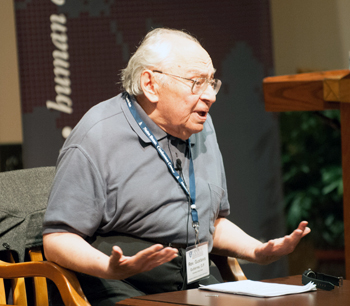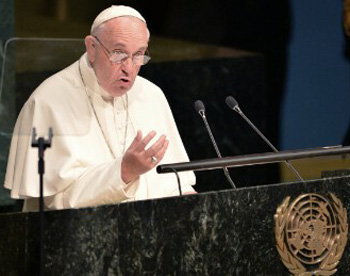Promoting Liberation Theology &
Communist Aims
Robert P. Banaugh, Ph.D.
Pope Francis has said repeatedly that the objective of his papacy is relieving the plight of the poor and downtrodden. In his great desire to achieve this objective, he has insisted that the Conciliar Church must devote itself to the poor, the suffering and the outcasts of society. His insistence is so fervent that he has even called on the Conciliar Church to kneel before the poor.

Symbols of Liberation Theolgy ‘adapted’ for Catholic use...
Card. Gerhard Müller, the Prefect of the Congregation for the Doctrine
of the Faith, confirmed the Pope’s insistence for his papacy to be
devoted to relieving poverty. In an interview,
the Cardinal said “The main aim of Pope Francis’s pontificate is to
draw the world’s attention to the poor and to change the global
structures that lead to poverty.”
To encourage the Church’s efforts to achieve his social and economic
objectives for the Conciliar Church, Pope Francis is imposing on it
tenets of Liberation theology (LT), a theology vigorously promoted by the Jesuits.
LT is a modification of the traditional Catholic Faith that draws many
of its social and economic policies from Communism. It is turned
principally against the economic system in the West, that is,
Capitalism.
Socialism and Communism are alike in that both systems are based on
public ownership of the means of production and centralized planning.
Socialism grows directly out of Capitalism; it is the gradual
transformation of the organic social and economic laws of a capitalist
State into socialist laws. It is the first step of a totally egalitarian
society.
Communism is a further development or “higher stage” of Socialism in
which the same ideals are imposed at once by force on a State. Because
both Socialism and Communism require an egalitarian set of economic and
management policies, many intellectuals are attracted to Socialism and
Communism. (1) Since its establishment by St. Ignatius, the Jesuit Order
has been considered one of the most “intellectual” of the religious
orders. (2) Thus it may not be surprising that the Jesuits adopted
Communism inspired Liberation Theology as a means to “assist the poor.”
The objective of helping the poor is indeed laudable. Throughout the
world prior to the Council, the Catholic Church’s efforts to aid the
poor were very effective. Not only were the Church’s orders, missions
and works turned toward assisting the poor materially, but above all,
they were motivated by the primary aim of converting souls. (3)
Thus, in light of Communism’s poor economic record as well as its
dreadful treatment of the ordinary citizenry together with its avowed
hatred of God and the Catholic Church, the Jesuits’ choice of Communism
inspired LT to help the poor is open to severe criticism. For such a
choice can only impede the purpose for which Christ established the
Catholic Church.
In its alleged desire to help the poor, the Conciliar Church has imposed
LT in some South American countries, giving LT the appearance of being a
second magisterium.
Francis vigorously promotes LT
Francis has gone further than the other conciliar Popes in putting a
stamp of approval on LT. One of the early acts of his pontificate was
to affirm Leonardo Boff, the Brazilian leader of LT, by requesting a copy of his then-recent work. Later, Francis greeted another well known Brazilian leader of LT, Frei Beto, in St. Peter’s Square.

One of LT founders Fr. Gutierrez affirms the Pope used his books to write Laudato Si'
Some months later he warmly greeted
Fr. Gustavo Gutierrez, considered the father of Liberation Theology, at
an audience in Rome. A little before the publication of Laudato Si’, Boff had declared on a TV round table
that Francis had asked for some of his articles to use as inspiration
for the encyclical. Further, the expression “common home,” which was
used in the title of his encyclical referring to earth, was coined by
Boff.
Francis has promoted as often as possible communist goals. His trip to Cuba to support the notorious murderers, the
Castro brothers, and his visit to Bolivia, in which he posed holding the hammer & sickle, are just two examples on a long list.
Church of Man vs. Church of God
This general line of action projects the false impression that the
Conciliar Church can change all Catholic teachings, which would have
ceased to be immutable. This would apply not only to the
political-economic sphere, but to Morals and the Church institutions.
Indeed, in a private conversation with Francis’ old friend, Oscar Crespo,
the Pope, according to Crespo, affirmed he was eager to change
important “archaic” parts of Catholic rules and intended to overthrow
“the centuries old ban” on priests getting married as well as to lift
the ban on divorce in the Catholic Church.
 So, we have Communism which promotes an end to private property, in
contradiction to the Eighth Commandment, and the banishment of divorce, a
direct contradiction of the Sixth Commandment. The Commandments are
certainly a set of “archaic rules;” thus, one wonders if the Pope also
intends to ban the Ten Commandments...
So, we have Communism which promotes an end to private property, in
contradiction to the Eighth Commandment, and the banishment of divorce, a
direct contradiction of the Sixth Commandment. The Commandments are
certainly a set of “archaic rules;” thus, one wonders if the Pope also
intends to ban the Ten Commandments...
Conciliar Church actions and teachings such as those described in this
series of articles contradict Jesus' insistence that the Faith is
immutable and must be maintained unchanged. Throughout her long history,
the Catholic Church assured the immutability of the Faith and
maintained its integrity. Then, Vatican Council II came, dominated by
many progressivist periti and Bishops, which encouraged the
alteration of several tenets of the Catholic Faith. Card. Henri de
Lubac, an influential progressivist
perito at the Council, admitted this:
“The drama of Vatican Council II consists in the fact that instead of
having been conducted by saints, as was the Council of Trent, it was
monopolized by intellectuals. Above all it was monopolized by certain
theologians, whose theology started off with the preconception of
updating the Faith according to the demands of the world and to
emancipate it from a pre-supposed condition of inferiority with respect
to modern civilization.
“The place of theology ceased to be the Christian community; that is,
the Church became the interpretation of intellectuals. In this sense the post-conciliar period represented the victory of Protestantism within Catholicism.” (4)

The Pope pleads with nations at the UN to address climate change
In closing, with each passing week, it is becoming increasingly evident
that Pope Francis intends to devote his papacy to temporal problems such
as relieving the plight of the poor, the elimination of the gap between
the poor and the wealthy, world peace, environmental issues such as
“global warming” and its impact on the world, overpopulation, etc. The
media are quick to favorably report his stand on such issues.
By so doing, the people are led to believe that the Conciliar Church has
changed the Catholic Church’s purpose from giving honor and glory to
God and the salvation of souls to creating an earthly “nirvana” in which
man is god, because man is free to change the will of God.
To assist in establishing this new “man is god” Conciliar Church, the
conciliar Popes have elevated to positions of authority clerics imbued
with Progressivism, a philosophy based on the false notion there are no
permanent truths. The actions of Pope Francis are in full accordance
with the words of Pope Paul VI in his closing speech to Vatican Council II: “We, too, in fact, we more than any others, have the cult of man.”
- I suggest that my readers Political Pilgrims by Paul
Hollander, a book that describes how intellectuals in Western countries
embrace the communist ideology. They do this despite being fully aware
the ordinary people in communist countries always starved and the
intellectuals rotted in prison.
The book Intellectuals and Society by Thomas Sowell documents
many of the failures of planned economies imposed by intellectuals (in
particular, See Chapter. 3, “Intellectuals and Economics”).
See also The Gulag Archipelago by Alexander Solzhenitsyn and Against All Hope: A Memoir of Life in Castro’s Gulag by
Armando Valladores. These two last works describe the horror of the
labor and prison camps in communist Russia and Cuba respectively.
- See also the book: The Jesuits; The Society of Jesus and the Betrayal of the Roman Catholic Church (1980) by Malachi Martin
- Christ himself confirmed the perpetual existence of the poor. He
said: “For the poor you have always with you: and whensoever you will,
you may do them good: but me you have not always” (Mk 14:7; cf. Mt
26:11).
The Bible had already commanded:“Therefore I command you, You shall open
wide your hand to your brother, to the needy and to the poor, in your
land” (Deut 15:11), and : “Whoever is generous to the poor lends to the
Lord, and He will repay him for his deed” (Proverbs 19:17).
- Apud Antonio Socci, The Fourth Secret of Fatima, Loreto Publications, 2009, p.136
Related:
http://tradcatknight.blogspot.com/2015/02/catholic-economics-and-liberation.html
http://tradcatknight.blogspot.com/2015/06/liberation-theology-kgb-invention-that.html
http://tradcatknight.blogspot.com/2015/05/ex-communist-spy-we-created-liberation.html
http://tradcatknight.blogspot.com/2014/10/liberation-theology-defender-helping.html

Symbols of Liberation Theolgy ‘adapted’ for Catholic use...

One of LT founders Fr. Gutierrez affirms the Pope used his books to write Laudato Si'


The Pope pleads with nations at the UN to address climate change
- I suggest that my readers Political Pilgrims by Paul
Hollander, a book that describes how intellectuals in Western countries
embrace the communist ideology. They do this despite being fully aware
the ordinary people in communist countries always starved and the
intellectuals rotted in prison.
The book Intellectuals and Society by Thomas Sowell documents many of the failures of planned economies imposed by intellectuals (in particular, See Chapter. 3, “Intellectuals and Economics”).
See also The Gulag Archipelago by Alexander Solzhenitsyn and Against All Hope: A Memoir of Life in Castro’s Gulag by Armando Valladores. These two last works describe the horror of the labor and prison camps in communist Russia and Cuba respectively.
- See also the book: The Jesuits; The Society of Jesus and the Betrayal of the Roman Catholic Church (1980) by Malachi Martin
- Christ himself confirmed the perpetual existence of the poor. He
said: “For the poor you have always with you: and whensoever you will,
you may do them good: but me you have not always” (Mk 14:7; cf. Mt
26:11).
The Bible had already commanded:“Therefore I command you, You shall open wide your hand to your brother, to the needy and to the poor, in your land” (Deut 15:11), and : “Whoever is generous to the poor lends to the Lord, and He will repay him for his deed” (Proverbs 19:17).
- Apud Antonio Socci, The Fourth Secret of Fatima, Loreto Publications, 2009, p.136
http://tradcatknight.blogspot.com/2015/02/catholic-economics-and-liberation.html
http://tradcatknight.blogspot.com/2015/06/liberation-theology-kgb-invention-that.html
http://tradcatknight.blogspot.com/2015/05/ex-communist-spy-we-created-liberation.html
http://tradcatknight.blogspot.com/2014/10/liberation-theology-defender-helping.html
